education
We fund primary school education, supplement staff salaries, subsidize secondary education, and…
Learn More
clinic
We support a permanent medical clinic, collaborate on a clean water project,…
Learn More
community health
We empower the communities we support to increase their education, health, and…
Learn More
economic development
We provide adult education, resources and local employment to support self-sufficiency.
Learn More
teams
Throughout the year we send medical teams to rural Northern Haiti to…
Learn More
You Can Help Hungry Children
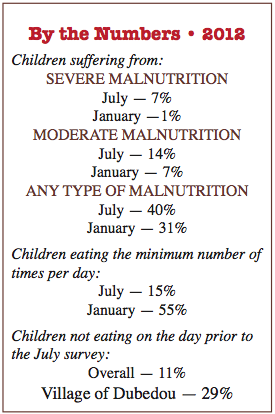
From the September 2012 newsletter:
The difference between a child’s health and malnutrition can be as simple as an egg a week.
This is one of the surprising findings of the ongoing nutrition project in the three communities involved in the Haiti Foundation of Hope community health program.
Earlier this year, the program shifted its focus to the problem of malnutrition, which includes monthly rally posts to monitor the growth of all children, identify and support those with malnutrition, provide nutrition education for mothers, and implement a “Positive Deviance/Hearth” program.
Hearth’s innovative strategy, which has been used for more than 30 years in Haiti, starts by identifying the positive feeding practices of poor families with healthy children. In every community, there are a few families who have discovered small and affordable ways to keep their children nourished despite material poverty.
The community health volunteers have led an assessment to discover “positive deviance” practices and found that small differences such as one egg per week, more continuous breast-feeding, thick porridge, healthy soup with gathered greens, affectionate attention, hand washing, and vaccinations were associated with healthier children.
The next step will be to implement “hearth” sessions, where volunteer mothers teach these healthy practices to the families of malnourished kids during cooking sessions that provide extra meals for children.
The Hearth cooking sessions will begin this month, right on the heels of Tropical Storm Isaac and a persistent drought. The nutrition situation in northern Haiti has become more precarious, as good harvests of sorghum and corn during the wet season were offset by a long period of drought followed by torrential rains and tropical storms which washed away crops from the degraded land.
This year has seen a particularly severe series of events around Terre Blanche, including the complete failure of winter crops and the extraordinarily rare event of the River LaBranle completely drying up. This was followed by rains which brought back the cholera epidemic. All of these events have resulted in a measurable worsening of the nutritional status of children.
The routine statistical surveys we carry out every six months tells the tragic story. In January, the nutrition situation for children was similar to the original survey done in 2009, showing that about 8% of children had at least moderate malnutrition, and 31% were at least mildly malnourished.
However, after the drought and crop failures, the situation in July was much worse. We have now found that almost 40% of children have some form of malnutrition, with 21% at least moderately malnourished. Most concerning are the 7% of children with severe malnutrition, up from only 1% previously.
Digging deeper into the reasons for this terrible situation, we found that only 15% of children are eating the minimum number of times per day, down from 55%. Because children need a diverse diet, we also measured the number of food groups that are eaten every day, and found that 80% of children only eat from one food group, and 11% of children had no food at all during the day prior to the July survey. In the village of Dubedou, 29% of children had nothing to eat. The severity of food deprivation in Dubedou is reflected in its malnutrition rate of 47%.
HFH is also responding to the malnutrition emergency with direct aid to meet immediate needs. We also continue to support the most severely malnourished children with Medika Mamba, a peanut-based therapeutic food.
These efforts are undertaken by a committed group of Haitian volunteers who make incredible sacrifices every day to serve God and show love to their neighbors. Standing together, we can support our brothers and sisters to overcome so many challenges.
How to Help
To help the children living in and around Terre Blanche, you can donate online to Haiti Foundation of Hope. Some of the many programs you can give to are:
- Education – ensures each student gets a hot meal every day
- Beans and rice – distributes food to the most needy families
- Community health – helps families feed their children and develop healthy habits







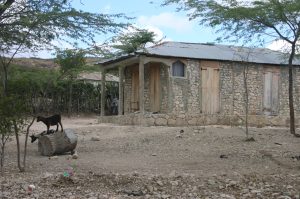

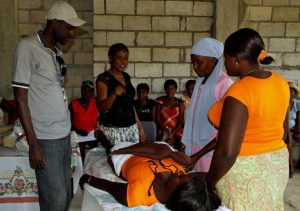
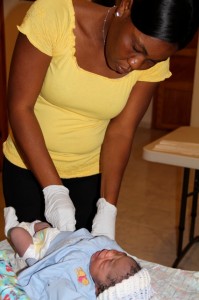
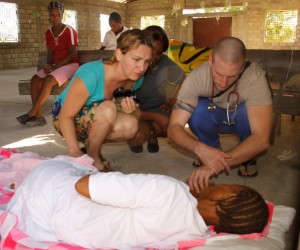 After you have seen it once, the diagnosis of cholera seems possible in the eyes alone. The afflicted stare into the miasma, their eyes literally sunk into their skulls, eyes that portray panic or resignation depending on the progression of the disease. Cholera is horrifying in speed and viciousness, and it is certainly inflicting that fear on the people of Terre Blanche, Haiti.
After you have seen it once, the diagnosis of cholera seems possible in the eyes alone. The afflicted stare into the miasma, their eyes literally sunk into their skulls, eyes that portray panic or resignation depending on the progression of the disease. Cholera is horrifying in speed and viciousness, and it is certainly inflicting that fear on the people of Terre Blanche, Haiti.
 Instagram Feed
Instagram Feed
